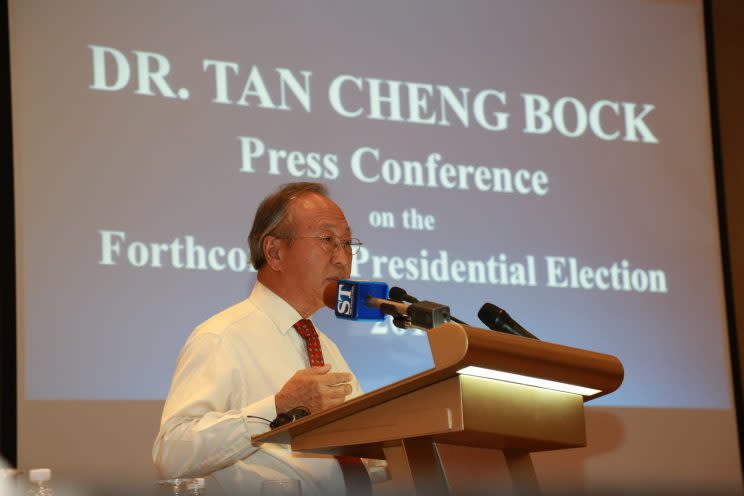COMMENT: Does Tan Cheng Bock have a game plan?

Four or five terms? Former president Wee Kim Wee or his successor Ong Teng Cheong?
Tan Cheng Bock, the man who nearly became the President of Singapore in 2011, fired the first shot in putting the next presidential election under a cloud. He wants the government to explain clearly whether Singapore has had four or five terms of Elected Presidency.
The number is important because it will determine if the next election can be contested by Singaporeans of all races or whether it will be reserved for one community. The Attorney-General’s Chambers’ interpretation is that Wee, and not Ong, was the first Elected President (EP) because though the former was nominated to the post, he carried out the role of an EP mid-way through his term. That will then make the September election a closed one reserved for Malay candidates.
Tan thinks otherwise. “In all my 26 years in Parliament, we had referred to Mr Ong Teng Cheong as the first Elected President,” said Tan, who was speaking at a press conference on Friday (31 March).
To get an idea of Tan’s game plan, one needs to look closely at his press statement. He said, “If need be, the Government can refer the AGC’s opinion to the court for independent judicial review.”
Although he didn’t say so explicitly, that could be where Tan wants the matter to be settled. If the government doesn’t take the bait, Tan might just decide to test it out in court. When asked if he would take that route, he said he wouldn’t rule it out.
What complicates his game plan is the fact that even if – and that is a big if – the court rules that the next election should not be a closed contest, Tan might still not qualify as a candidate. There is another change in the Elected Presidency rules that might just disqualify him. Private sector candidates like Tan must have led a company with at least $500 million in shareholders’ equity, up from $100 million in paid-up capital previously. Also, candidates must have held the most senior executive position in the company and were in that position for 15 years just before Nomination Day.
Asked about it at the press conference, Tan took the moral high ground and said, “you must do what you believe in”.
Even if he manages to open the first lock, he will still have to unlock the second one, which looks doubtful. With this kind of a double lock placed on him, Tan must have calculated that testing AGC’s interpretation will keep the debate alive and show to Singaporeans that they should not take it sitting down if they feel a wrong has been done.
Denied of a win in 2011 when he came tantalisingly close to becoming the President with a losing margin of just 0.45 percentage point, Tan faces the prospect of sitting out the election this time round, and also at the 2023 polls when his age will hit a ripe old 82.
Tan must have calculated that it was better to leave the political scene with a fight. Fights are not new to the man who has fought the good fight since he became a PAP MP in 1980 by opposing the Nominated Member of Parliament scheme and speaking out strongly against the foreign talent immigration measures.
Tan is a veteran politician known for picking his fights carefully and making his moves meticulously, but with the presidential election rules stacked heavily against him, failure is what he is likely to confront.
P N Balji is a veteran Singaporean journalist was formerly chief editor of Today, as well as an editor at The New Paper, and currently a media consultant. The views expressed are his own.


